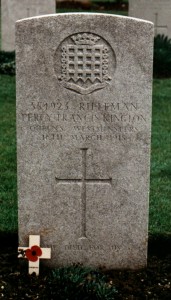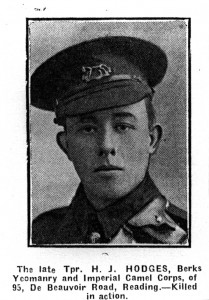Leonard William Levey
Private 44209
2/23 Bn.East Surrey Regiment
Little is known of Leonard William Levey except that he waskilled in action on 2 September 1918 during the time of the final British advance. He is buried at Wulverghem-Lindenhoek Road Cemetery, location V.E.17.
The 1911 census spells his name as Lenard William Levy and gives his address as 101, Orts Road, Reading. There were seven children living at home between the ages of 25 and four years; Leonard’s age is given as eleven years. His mother had borne twelve children in total although four had died. Alfred Levey, father was recorded as a miller at the biscuit factory and of those old enough to work all except one were employed at the biscuit factory. In 1911 Leonard was still at school.
Two battalions of the 23rd were found during the First World War for overseas service with a reserve battalion at home. The 1/23rd fought in France and Flanders from March 1915 until the end of hostilities in 1918, being involved in actions at Festubert, Loos, the Somme in 1916 and 1918, Messines, Ypres, Cambrai, Lille and Tournai. Casualties were heavy, 237 being killed and 262 wounded at Givenchy during the Battle of Festubert. The 2/23rd went initially to France in June 1916 but later went to Salonika and then to Egypt to take part in General Allenby’s offensive against the Turks in Palestine. Finally they returned to France in 1918 and saw action around Ypres. http://www.queensroyalsurreys.org.uk/militia_vol_territorial/mvt19_1.html
Leonard William would have been about 18 years old at the time of his death and it is not known when he joined his battalion. His name is on the Alfred Sutton School war memorial.

